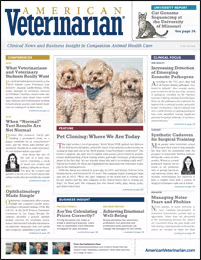Honing in on the Real Needs of Veterinarians
Veterinary medical schools are paying much closer attention than ever before to the mental health of their students, with many programs including a mental health professional on staff.

The 29th Atlantic Coast Veterinary Conference® (ACVC) is officially in the books! Based on attendee survey results, it’s safe to say that the 4-day New Jersey conference held last month exceeded expectations all around—from the top-notch speakers presenting high-quality content to the professionalism of event staff to the delicious food served throughout the event. In fact, many attendees told us that this year’s conference was the best ACVC they’ve attended.
Of the 3 general sessions presented at the conference, 1 stood out as being particularly relevant to practice owners and hiring managers. Amanda Landis-Hanna, DVM, senior manager of veterinary outreach for PetSmart Charities, presented some unexpected data from a recent survey of veterinary students, veterinarians, and animal welfare organization leaders. Most surprising was the fact that all respondents agreed that the most important factor when considering a job offer is an equitable work—life balance. For veterinarians—both in private practice and in animal welfare organizations—a good income was high on the list of must-haves, but money was much less important to students, despite all the debt they carry as they embark on their career. In fact, salary/bonus was “all the way down at No. 8” for student respondents.
The second most important consideration for the surveyed students when looking for their first position out of school is the practice environment. Toxic practices are a no-go, even if they offer a higher salary, they said. Not only do toxic practices lead to significant stress and high turnover, but patients can suffer because team members experiencing stress and anxiety are more likely to make a medical mistake. Toxicity can affect client relations as well because unhappy staff may be rude to or abrupt with the pet owners who visit the practice.
Veterinary medical schools are paying much closer attention than ever before to the mental health of their students, with many programs including a mental health professional on staff. This heightened awareness of mental health issues may be one of the reasons why veterinary students are so adamant about not working in toxic practices.
Toxic practices are one of the many factors at play in the mental health crisis facing the veterinary profession. Learning how to cope with the stressors of the profession and creating a work environment that supports emotional well-being should be top priorities for all types of practices.
This month, we also share insights into strategies anyone can adopt to mitigate stress and anxiety. These strategies range from practicing gratitude and meditation to reconnecting with why you joined the profession in the first place.
It is our goal to address the diverse educational needs of the veterinary community, and our team will continue to work diligently to provide high-quality content and a successful educational experience for you through both American Veterinarian® and live events.
Mike Hennessy
Sr Chairman and CEO
